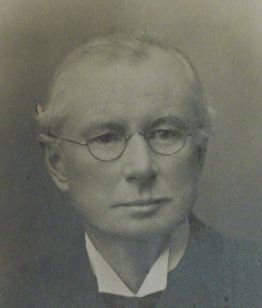Robert Stanton Ellis was a British civil servant of the Indian civil service who served as a member of the Madras Legislative Council.
James Duncan SimCSI was a British civil servant of the Indian civil service who served as a member of the Madras Legislative Council from March 1870 to March 1875.

Sir Henry Edward Stokes was an Irish civil servant of the Indian civil service who served as a member of the Madras Legislative Council from 1888 to 1893.
Sir Henry William BlissKCIE was a British civil servant of the Indian civil service who served as a member of the Imperial Legislative Council of India from 1890 to 1892 and Madras Legislative Council from 1893 to 1898.
Sir Thomas Eyebron MoirKCIE CSI (1874-1932) was an Indian civil servant of British origin. He served as the Revenue member of the executive council of the Governor of Madras from 1925 to 1930.
Sir Philip Perceval Hutchins was a British lawyer and civil servant who served as a member of the Madras Legislative Council and the Imperial Legislative Council of India.
Sir George Stuart Forbes was an Indian civil servant who served as a member of the Executive Council of the Governor of Madras from 1906 to 1909.
The New Year Honours were appointments by King George V to various orders and honours to reward and highlight good works by citizens of the United Kingdom and British Empire. They were announced on 31 December 1926.
The 1912 Birthday Honours were appointments in the British Empire of King George V to various orders and honours to reward and highlight good works by citizens. The appointments were made to celebrate the official birthday of The King, and were published on 11 June 1912.
The 1931 New Year Honours were appointments by King George V to various orders and honours to reward and highlight good works by citizens of the United Kingdom and British Empire. They were announced on 30 December 1930.
The 1924 New Year Honours were appointments by King George V to various orders and honours to reward and highlight good works by members of the British Empire. They were published in The London Gazette on 1 January 1924.
The New Year Honours 1922 were appointments by King George V to various orders and honours to reward and highlight good works by members of the British Empire. They were published on 30 December 1921.
The New Year Honours 1926 were appointments by King George V to various orders and honours to reward and highlight good works by members of the British Empire. They were published on 29 December 1925.
The Queen's Birthday Honours 1900 were announced on 23 May 1900 in celebration of the birthday of Queen Victoria. The list included appointments to various orders and honours of the United Kingdom and British India.
The 1942 New Year Honours were appointments by King George VI to various orders and honours to reward and highlight good works by citizens of the United Kingdom and British Empire. They were announced on 30 December 1941.
The 1891 Birthday Honours were appointments by Queen Victoria to various orders and honours to reward and highlight good works by citizens of the British Empire. The appointments were made to celebrate the official birthday of The Queen, and were published in the London Gazette on 29 May 1891 and in The Times on 30 May 1891.
The 1892 Birthday Honours were appointments by Queen Victoria to various orders and honours to reward and highlight good works by citizens of the British Empire. The appointments were made to celebrate the official birthday of The Queen, and were published in the London Gazette on 24 May 1892 and in The Times on 25 May 1892.
The New Year Honours 1896 were appointments by Queen Victoria to various orders and honours to reward and highlight good works by members of the British Empire. They were published on 1 January 1896.
The 1922 Birthday Honours were appointments by King George V to various orders and honours to reward and highlight good works by citizens of the British Empire. The appointments were made to celebrate the official birthday of The King, and were published in The London Gazette on 2 June 1922.
The New Year Honours 1903, announced at the time as the Durbar Honours, were appointments to various orders and honours of the United Kingdom and British India. The list was announced on the day of the 1903 Delhi Durbar held to celebrate the succession of King Edward VII and Queen Alexandra as Emperor and Empress of India. The membership of the two Indian Orders were expanded to allow for all the new appointments.